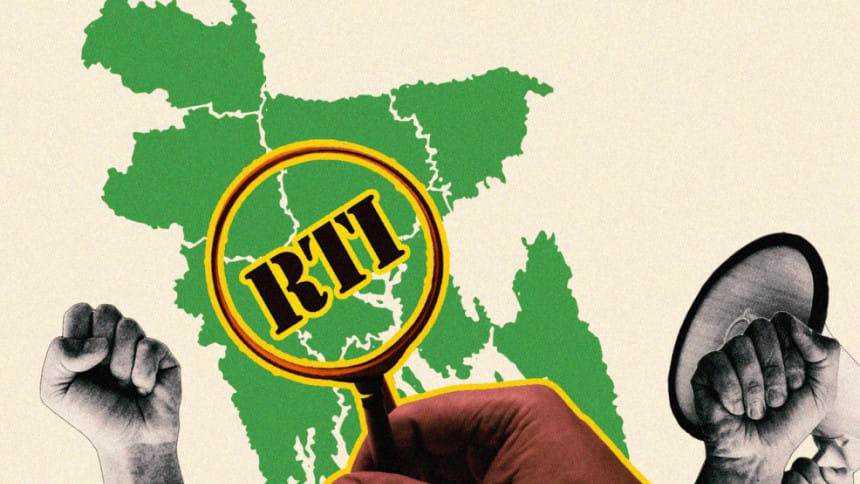Citizens lament RTI paralysis in Bangladesh

"I think there is a deliberate attempt to downgrade the use of the RTI law. There are no protection mechanisms in place to protect whistleblowers, and we hear about so many incidences of corruption and malpractice daily, but how do you raise the alarm?"
This is a typical lament of an activist who uses Bangladesh's Right to Information (RTI) Act 2009 to unearth corruption and hold the government to democratic account. Since the departure of the three Information Commissioners soon after the 2024 July uprising, this column has sought to draw the interim government's attention to the urgent need to appoint a new set of commissioners. We emphasised that, apart from the urgent reform of various institutions and mechanisms of governance destroyed through past misrule, there was an overriding need to uphold the importance of citizens' role in monitoring the work of all public authorities for better governance. This, we argued, can be advanced by conscious citizens' unhindered use of the RTI law. We underlined that the emergence of an alert group of youthful citizens who spearheaded the uprising was propitious for better and more effective use of the law and for taking it forward.
RTI applications, especially those affecting transparency and accountability, remain unanswered in most cases. As there is no recourse without the Information Commissioners, the recalcitrant officials could not be brought to book. The frustrated adherents of the RTI Act saw the delay in appointing commissioners as a deliberate act by the authorities to weaken transparency and accountability in governance.
An activist from North Bengal described his frustrations as follows: "I had engaged myself in utilising and promoting the RTI Act because I believe that, in doing so, we, as citizens, can make a great contribution to the affairs of the state, but now I feel discouraged because I see there are no commissioners. So, there is no remedy in case of any dispute arising from an application. On the other hand, public authorities have become very casual about compliance with the law; I am not getting responses to my RTI requests. This is very frustrating—I no longer feel the excitement that I am contributing."
An irate RTI user said, "We are faced with a dismal situation. We file RTI requests, but Designated Officers (DOs) do not bother to respond because they do not care about compliance. One reason is that they know there are no Information Commissioners at the moment, so the likelihood of them imposing fines or recommending departmental action does not exist. This gives the DOs enough leeway to get away without compliance. As a result, a backlog of pending cases with the commission, applications and appeals pile up without resolution, discouraging citizens from filing RTI requests."
Another bemoaned: "It seems no one is bothered that so many complaints are piling up at the commission without any action. This is absolutely not acceptable. On top of that, the government is incurring huge expenses on a commission that has been sitting idle for so many months. This is all taxpayers' money they are wasting."
Another was more aggressive: "I am surprised that the present regime is not realising the importance of such a transparency law, though they never fail to talk about their determination to reform all important governance sectors. But how much reform is possible by strategically keeping this most important law on the back burner and making it redundant?"
Other observations reveal the practical difficulties users face. One applicant said, "When I submitted RTI applications in recent months, a few authorities reprimanded me for using the law. They told me that I must stop all this nonsense now. They asked me to forget the RTI law, saying it is no longer in force. Some even mock us. Many of us are already disheartened. We feel sorry that the law, which saw some progress, is going backwards now."
Another observed: "We all know that the law prescribes Tk 2 as a photocopy charge for each page, but now the authorities demand excess fees from us, and when we challenge them, they misbehave with us." Similar problems are revealed in another observation: "There has been a rise in cases in recent months in which exorbitant fees are demanded for the information requested, just to harass the applicants. And we know that applications are being returned on the plea that the office address is incorrect, though that was not the case. In some cases, the information is denied, citing Section 7 as a reason, without any justification as required by the law."
There seem to be differences in response depending on the authorities' location. According to some users, authorities who know there are no commissioners deliberately avoid responding to RTI applications. This applies mainly to government offices at the divisional and district levels. However, upazila-level offices, which are unaware, tend to respond as before.
The RTI community perceives the delay in appointing commissioners as deliberate neglect and considers it a tactic to weaken transparency efforts. Some journalists felt that they faced risks when filing RTI applications. Without an active commission, they lack protection or recourse in cases of harassment or denial. According to others, public authorities are under no pressure to comply with proactive disclosure requirements without a functioning commission.
The frustration and dismay in the statements quoted above reveal the concern of our citizens committed to promoting transparency and accountability of public offices in the country, as envisioned in the RTI Act. The longer such frustrations continue, the greater the danger that the gains made over the years in creating awareness and implementing the law will be largely lost. We know that measures for improving the existing RTI Act are included in the recommendations of one or more reform commissions set up by the interim government. While their approval and implementation will take time, attention must be given immediately to the appointment of the three Information Commissioners so that the law does not perish in the meantime through neglect and inaction.
Dr Shamsul Bari and Ruhi Naz are chairman and assistant director (RTI), respectively, at Research Initiatives, Bangladesh (RIB). They can be reached at [email protected].
Views expressed in this article are the author's own.
Follow The Daily Star Opinion on Facebook for the latest opinions, commentaries and analyses by experts and professionals. To contribute your article or letter to The Daily Star Opinion, see our guidelines for submission.

 For all latest news, follow The Daily Star's Google News channel.
For all latest news, follow The Daily Star's Google News channel. 










Comments